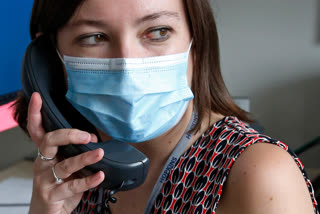Salt Lake City: Health investigator Mackenzie Bray smiles and chuckles as she chats by phone with a retired Utah man who just tested positive for the coronavirus.
She’s trying to keep the mood light because she needs to find out where he’s been and who he’s been around for the past seven days. She gently peppers him with questions, including where he and his wife stopped to buy flowers on a visit to a cemetery. She encourages him to go through his bank statement to see if it reminds him of any store visits he made.
Midway through the conversation, a possible break: His wife lets slip that they had family over for Mother’s Day, including a grandchild who couldn’t stop slobbering.
“Was there like a shared food platter or something like that?” Bray asks. “There was, OK, yep ... sharing food or sharing drinks, even just being on the same table, it can spread that way.’”
Suddenly, with a shared punch bowl, the web has widened, and Bray has dozens of more people to track down.
She is among an army of health professionals around the world filling one of the most important roles in the effort to guard against a resurgence of the coronavirus. The practice of so-called contact tracing requires a hybrid job of interrogator, therapist and nurse as they try to coax nervous people, to be honest.
The goal: To create a road map of everywhere infected people have been and who they’ve been around.
While other countries have devised national approaches, a patchwork of efforts has emerged in the US where states are left to create their own program.
Bray normally does this type of work to track contacts for people with sexually transmitted diseases. She is now one of 130 people at the Salt Lake County health department assigned to track coronavirus cases in the Salt Lake City area. The investigators, many of them nurses, each juggle 30 to 40 cases and try to reach everyone the original person was within 6 feet (1.8 meters) of for 10 minutes or more. They stay in touch with some people throughout the 14-day incubation period, and calls can take 30 minutes or more as they meticulously go through a list of questions.
Read more:WHO, a puppet of China, says Trump
Some estimate as many as 300,000 contact tracers would be needed in the US to adequately curtail the spread. While some states like Utah have reported having enough contact tracers, others are hundreds or even thousands of people short.
The contact tracers often find themselves in a tangled web of half-truths and facts that don’t match up. Language and cultural barriers arise that require interpreters and taxing conversations that leave the investigators wondering if the person understands what they’re trying to do.
They land on occasion into complicated family dynamics where people are reluctant, to tell the truth.
DiCaro found out days into a case that a father was sleeping in his car because he and his wife were separating. The man had stopped returning DiCaro’s calls, and that key information came from his childhood.
“I get people that lie all time,” DiCaro said. “I try to get as much information from the beginning but it’s just not always the case. And time is one of those things you can’t take back when you are trying to prevent and you know to do these contact tracing investigations.”
Each call is an exercise in good cop, bad cop. She needs people to cooperate, but no one is legally required to answer the questions. Usually, kindness works better than strong words.
